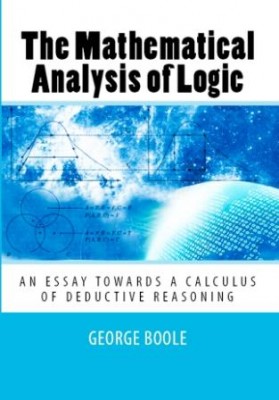More Search Results...
George Boole (1815 – 1864) was an English mathematician, philosopher and logician. He worked in the fields of differential equations and algebraic logic, and is now best known as the author of The Laws of Thought.
Boole said,
… no general method for the solution of questions in the theory of probabilities can be established which does not explicitly recognise …
those universal laws of thought which are the basis of all reasoning …
Boole was born in Lincolnshire, England. His father, John Boole (1779–1848), was a tradesman in Lincoln, and gave him lessons. He had an elementary school education, but little further formal and academic teaching. William Brooke, a bookseller in Lincoln, may have helped him with Latin; which he may also have learned at the school of Thomas Bainbridge. He was self-taught in modern languages. At age 16 Boole became the breadwinner for his parents and three younger siblings, taking up a junior teaching position in Doncaster, at Heigham’s School. He taught briefly in Liverpool.
Boole participated in the local Mechanics Institute, the Lincoln Mechanics’ Institution, which was founded in 1833. Edward Bromhead, who knew John Boole through the Institution, helped George Boole with mathematics books; and he was given the calculus text of Sylvestre François Lacroix by Rev. George Stevens Dickson, of St Swithin Lincoln. Without a teacher, it took him many years to master calculus.
In 1841 Boole published an influential paper in early invariant theory. He received a medal from the Royal Society for his memoir of 1844, On A General Method of Analysis. It was a contribution to the theory of linear differential equations, moving from the case of constant coefficients on which he had already published, to variable coefficients. The innovation in operational methods is to admit that operations may not commute. In 1847 Boole published The Mathematical Analysis of Logic , the first of his works on symbolic logic.
At age 19 Boole successfully established his own school at Lincoln. Four years later he took over Hall’s Academy, at Waddington, outside Lincoln, following the death of Robert Hall. In 1840 he moved back to Lincoln, where he ran a boarding school.
With E. R. Larken and others he set up a building society in 1847. He associated also with the Chartist Thomas Cooper, whose wife was a relation. From 1838 onwards Boole was making contacts with sympathetic British academic mathematicians, and reading more widely.
The Mathematical Analysis of Logic: “An Essay Towards a Calculus of Deductive Reasoning”
The Theory of Symbolical Algebra, are aware, that the validity of the processes of analysis does not depend upon the interpretation of the symbols which are employed, but solely upon the laws of their combination. Every system of interpretation which does not a_ect the truth of the relations supposed, is equally admissible, and it is thus that the same process may, under one scheme of interpretation, represent the solution of a question on the properties of numbers, under another, that of a geometrical problem, and under a third, that of a problem of dynamics or optics.
This principle is indeed of fundamental importance; and it may with safety be affirmed, that the recent advances of pure analysis have been much assisted by the inuence which it has exerted in directing the current of investigation. But the full recognition of the consequences of this important doctrine has been, in some measure, retarded by accidental circumstances. It has happened in every known form of analysis, that the elements to be determined have been conceived as measurable by comparison with some fixed standard.
More info →




























